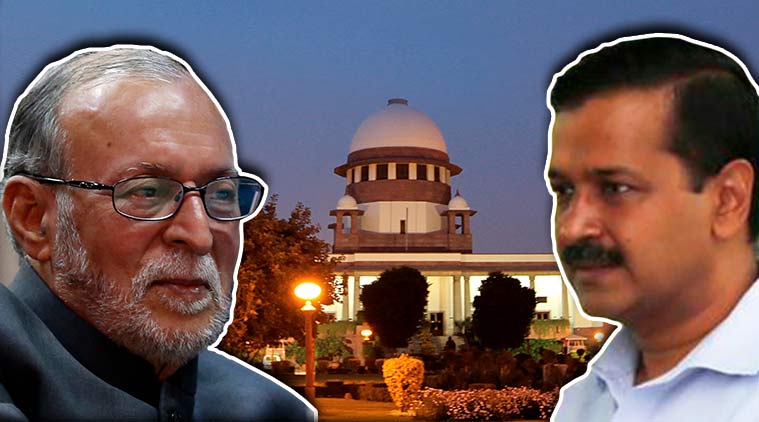 Delhi Chief Minister Arvind Kejriwal and LG Anil Baijal
Delhi Chief Minister Arvind Kejriwal and LG Anil Baijal
Upholding the Parliament’s power to make laws for the National Capital Territory of Delhi, the Supreme Court Wednesday called upon the Lieutenant Governor and Delhi Government to work in harmony and ruled that the decisions of the state government, however, will not require the concurrence of the Lieutenant Governor though they have to be communicated to him.
“The scheme that has been conceptualized by the insertion of Articles 239 AA and 239 AB read with the provisions of the GNCTD Act, 1991 and the corresponding TBR, 1993 indicates that the Lieutenant Governor, being the Administrative head, shall be kept informed with respect to all the decisions taken by the Council of Ministers. The terminology ‘send a copy thereof to the Lieutenant Governor’, ‘forwarded to the Lieutenant Governor’, ‘submitted to the Lieutenant Governor’ and ’cause to be furnished to the Lieutenant Governor’ employed in the said rules leads to the only possible conclusion that the decisions of the Council of Ministers must be communicated to the Lieutenant Governor but this does not mean that the concurrence of the Lieutenant Governor is required”, the five-judge Constitution bench said.
The court also upheld the powers of the LG under Article 239 AA (4) to differ with the decisions of the council of ministers and refer the matter to the President. The very purpose of communicating the decisions of the giver to the LG was to enable him to exercise this power if need be, the majority judgment by Chief Justice of India Dipak Misra and Justices A K Sikri and A M Khanwilkar said.
On issues that the LG may Differ with the government, the Judges said, “The difference of opinion between the Lieutenant Governor and the Council of Ministers should have a sound rationale and there should not be exposition of the phenomenon of an obstructionist but reflection of the philosophy of affirmative constructionism and profound sagacity and judiciousness”.
If Modi govt had not withdrawn the powers of elected govt thro illegal orders, precious three years wud have been saved. People of Delhi are grateful to judiciary. Today’s order reinforces people’s faith in judiciary
— Arvind Kejriwal (@ArvindKejriwal) July 4, 2018
Justice D Y Chandrachud who wrote a separate concurring judgment said, “While it may not be possible to make an exhaustive catalogue of those differences which may be referred to the President by the Lieutenant Governor, it must be emphasised that a difference within the meaning of the proviso cannot be a contrived difference. If the expression ‘any matter’ were to be read as ‘every matter’, it would lead to the President assuming administration of every aspect of the affairs of the Union territory, thereby resulting in the negation of the constitutional structure adopted for the governance of Delhi.”
Justice Chandrachud added that before the L-G decides to make a reference to the President, he “must, by a process of dialogue and discussion, seek to resolve any difference of opinion with a Minister and if it is not possible to have it so resolved to attempt it through the Council of Ministers. A reference to the President is contemplated by the rules only when the above modalities fail to yield a solution.”
The court also said that the proviso to Article 239 AA is in the nature of a protector to safeguard the interests of the Union on matters of national interest in relation to the NCT’s affairs. “Every trivial difference does not fall under the proviso. The proviso will, among other things, encompass substantial issues of finance and policy which impact upon the status of the national capital or implicate vital interests of the Union.”
The court ruled that the meaning of ‘aid and advise’ employed in Article 239AA(4) has to be construed to mean that the LG “is bound by the aid and advice of the Council of Ministers and this position holds true so long as the Lieutenant Governor does not exercise his power under the proviso to clause (4) of Article 239AA”.
“The Lieutenant Governor has not been entrusted with any independent decisionmaking power. He has to either act on the ‘aid and advice’ of Council of Ministers or he is bound to implement the decision taken by the President on a reference being made by him”, the judgment added.
Justice Ashok Bhushan also wrote a separate judgment agreeing with the view that the LG has to be kept informed of all the decisions, but this does not mean the decisions require his concurrence.